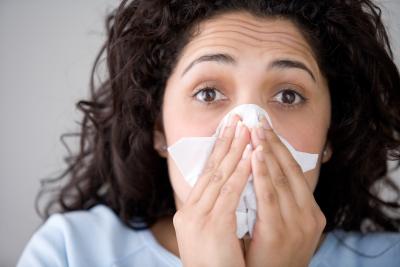Allergies can affect various body systems, including the insides of your nostrils and sinuses. Allergic rhinitis is an allergic response that occurs when the mucous membranes in your sinuses overrespond to certain particles. While some individuals experience seasonal allergies that occur in response to specific types of pollens and molds, other allergy sufferers have symptoms year-round.
Allergic Rhinitis
According to the American Academy of Allergy Asthma & Immunology that rhinitis affects between 10 and 30 percent of adults and up to 40 percent of children living in the United States. Allergic rhinitis occurs when your body mistakes harmless substances for threatening invaders. In response to allergens, your body produces immunoglobulin E, a class of antibodies. The antibodies encourage your cells to release chemicals that cause the mucus membranes in your nose to overreact.
Symptoms
Common symptoms of allergic rhinitis include post-nasal drip, stuffiness, a runny nose and sneezing. You may also experience itching around the vicinity of your nose. Occasionally, rhinitis can increase your risk of developing other problems, such as sinus headaches and sinus infections. Rhinitis can also cause trouble sleeping and may contribute to asthma.
Allergens
While allergy triggers vary between allergy sufferers, common substances that cause allergic rhinitis include pollen, mold spores, smoke, pet dander, cockroach droppings and dust mites. Substances in household materials, such as upholstery and carpeting, can cause allergy attacks in some individuals. Identifying and avoiding the substances that cause allergic responses can help reduce the frequency and duration of your attacks.
Home Remedy
Rinsing your sinuses may help provide relief by removing allergens and moisturizing your mucus membranes. The American Academy of Allergy Asthma & Immunology suggests you use a homemade saline solution to rinse your sinus cavities. Add 1 tsp. of baking soda to 3 heaping tsp.of salt that doesn’t contain iodine. Dissolve 1 tsp. of this mixture in 1 cup of lukewarm, boiled water. Introduce the saline solution slowly into your sinuses with a small bulb syringe.
Medical Treatments
Over-the-counter allergy medications contain antihistamines that help block your body’s response to allergens. Decongestants may help shrink swollen sinus membranes and dry up excess moisture. Do not use over-the-counter products longer than the instructions recommend. Your doctor may administer allergy shots, especially if your symptoms are frequent or constant. You may also need corticosteroids to treat stubborn or severe conditions. Consult with your doctor.





